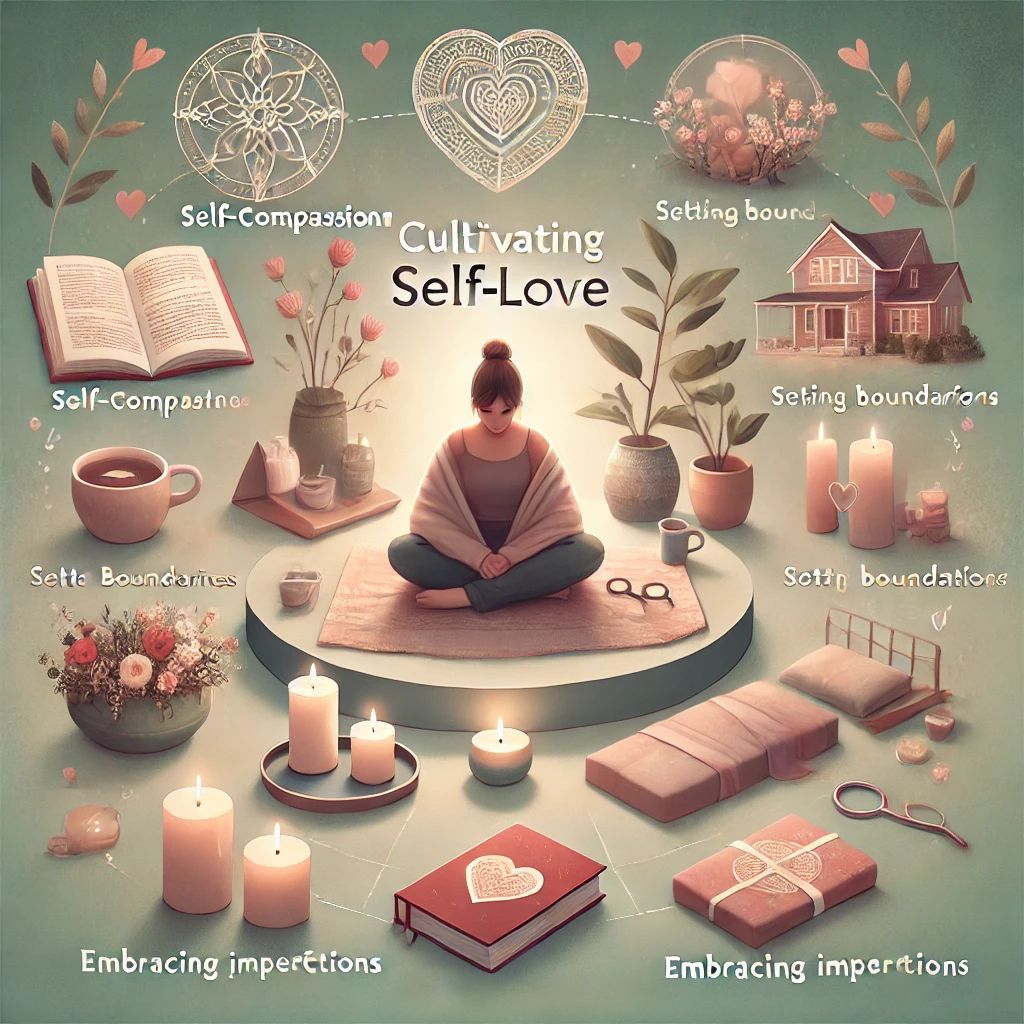
What is Healthy Self-Love?
Healthy self-love is the practice of treating yourself with kindness, respect, and compassion. It involves recognizing your worth, prioritizing your mental and physical well-being, and embracing your strengths and imperfections. Unlike self-indulgence or narcissism, self-love is about finding balance—meeting your own needs while remaining connected to others. It’s an essential foundation for mental health, personal growth, and building meaningful relationships.
Why is Self-Love Important?
Self-love plays a vital role in your overall well-being. When you practice self-love, you’re better equipped to handle stress, face challenges with confidence, and make healthier choices. It improves your emotional resilience, strengthens your self-esteem, and encourages you to set boundaries that protect your energy and mental health.
How to Cultivate Healthy Self-Love
Here are some key practices to help you develop a healthy self-love routine and foster a positive relationship with yourself:
1. Practice Self-Compassion
Self-compassion is about being kind to yourself, especially during difficult times or when you make mistakes:
Acknowledge your feelings: When you’re feeling upset or overwhelmed, take a moment to recognize and accept your emotions. It’s okay to feel sad, frustrated, or anxious—these feelings are part of being human.Be gentle with yourself: Instead of criticizing yourself for mistakes or setbacks, treat yourself with the same kindness you would offer a close friend. Remind yourself that no one is perfect and that it’s okay to stumble.Forgive yourself: Let go of self-judgment and guilt. Forgiving yourself for past mistakes allows you to move forward and focus on growth.2. Set Healthy Boundaries
Healthy self-love means protecting your time, energy, and well-being by setting boundaries that prevent burnout and maintain balance:
Say no when necessary: Don’t feel obligated to say yes to everything. Respect your limits and prioritize your needs by declining requests or invitations that overwhelm you or drain your energy.Communicate your needs: Clearly express your boundaries to others. Whether it’s requesting time for yourself or asking for support, open communication helps maintain healthy relationships and self-care practices.Prioritize self-care: Schedule regular self-care activities that nourish your body and mind, whether it’s taking a walk, reading a book, or spending time with loved ones.3. Celebrate Your Strengths and Accomplishments
Focusing on your achievements and strengths helps boost self-esteem and reinforces a positive self-image:
Acknowledge your successes: Take time to reflect on your accomplishments, both big and small. Celebrate your progress and remind yourself of how far you’ve come.Practice gratitude for yourself: In addition to being grateful for external blessings, cultivate gratitude for your unique qualities and strengths. Appreciate the qualities that make you who you are.Keep a self-appreciation journal: Write down positive affirmations or daily reflections on what you like about yourself. This helps reinforce a healthy mindset and encourages self-acceptance.4. Take Care of Your Body
Self-love isn’t just about mental and emotional well-being—it’s also about nurturing your physical health:
Prioritize nutrition: Feed your body nourishing foods that support your energy and vitality. Choose whole, unprocessed foods like fruits, vegetables, lean proteins, and healthy fats to fuel your body.Stay active: Exercise regularly to keep your body strong and healthy. Whether it’s yoga, walking, dancing, or strength training, find activities you enjoy that keep you moving.Get enough rest: Sleep is essential for physical and mental health. Prioritize rest by establishing a relaxing bedtime routine and aiming for 7–9 hours of sleep each night.5. Embrace Imperfections
Self-love involves accepting yourself as you are, including your flaws and imperfections:
Let go of perfectionism: Striving for perfection can lead to constant dissatisfaction and self-criticism. Instead, focus on doing your best and accepting that imperfection is part of the human experience.Love yourself unconditionally: Understand that your worth isn’t determined by external achievements or appearances. Embrace all aspects of yourself, even the parts you may not always like.Practice self-acceptance: Recognize that growth is a journey, and it’s okay to be a work in progress. Accept where you are in life, and trust that you’re doing your best.6. Surround Yourself with Positive Influences
The people you spend time with can have a significant impact on your self-love journey:
Build a supportive community: Surround yourself with friends, family, and mentors who uplift and encourage you. Positive relationships help you feel valued and supported.Limit negative influences: Distance yourself from people who consistently drain your energy or undermine your self-worth. Protecting your mental and emotional well-being is an important act of self-love.Seek inspiration: Follow individuals, read books, or listen to podcasts that promote self-love, personal growth, and positivity. Surrounding yourself with inspiring content can motivate you to continue your self-love journey.7. Engage in Self-Reflection
Taking time to reflect on your thoughts, feelings, and behaviors helps you gain a deeper understanding of yourself:
Practice mindfulness: Mindfulness involves staying present and fully experiencing each moment without judgment. Engaging in mindfulness exercises, like meditation or deep breathing, helps you connect with yourself on a deeper level.Journal regularly: Journaling allows you to process your emotions, track your progress, and reflect on your self-love journey. Writing about your thoughts and feelings can bring clarity and self-awareness.Identify negative thought patterns: If you notice recurring negative thoughts, challenge them by asking yourself if they’re truly valid. Reframe these thoughts with positive affirmations or constructive self-talk.Conclusion: The Importance of Healthy Self-Love
Healthy self-love is essential for living a balanced, fulfilling life. By practicing self-compassion, setting boundaries, celebrating your strengths, and caring for your body, you can nurture your well-being and build a stronger relationship with yourself. Embrace your imperfections, surround yourself with positive influences, and engage in regular self-reflection to continue growing in self-love. Remember, loving yourself is not selfish—it’s a necessary foundation for happiness, success, and meaningful connections with others.
The article was prepared by Lyle Gardner.



